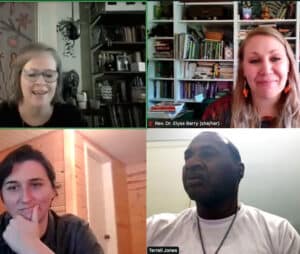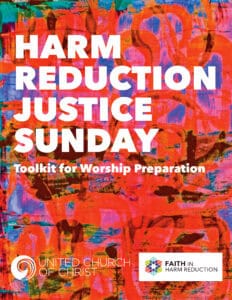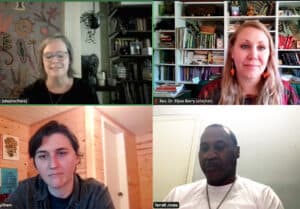Webinar Introduces the Hope and Promise of Harm Reduction Ministries and the UCC’s Harm Reduction Justice Sunday Resources for Congregations

A “Harm Reduction & Overdose Prevention in the Pulpit: Building a Meaningful Harm Reduction Justice Sunday Service” webinar took place June 27, 2024, to introduce a new resource for congregations participating in the UCC’s first-ever Harm Reduction Justice Sunday, scheduled for Aug. 18. The webinar is available online.
The webinar featured experts from across the field, including the Rev. Erica M. Poellot, the UCC’s minister of harm reduction and overdose prevention ministries; Terrell Jones, advocacy and community engagement mentor at OnPoint NYC; Hill Brown, southern director of Faith in Harm Reduction and southern ambassador for the UCC’s Harm Reduction and Overdose Prevention Ministries; and the Rev. Dr. Elyse Berry, associate for advocacy and leadership development for the UCC’s Council for Heath and Human Service Ministries (CHHSM). The webinar was moderated by the Rev. Ellie Hutchison, minister for congregational community engagement for the UCC’s Faith Education, Innovation, and Formation ministry.
The one-hour presentation included personal stories, and an exploration of the Harm Reduction Sunday toolkit’s elements. The kit which was produced in partial fulfillment of the resolution on Harm Reduction Justice passed by the UCC’s 2023 General Synod. The webinar included ways the materials can be introduced to congregations.
“This upcoming Harm Reduction Justice Sunday is a first for the wider church, but it also may very well be the first time this topic has even been mentioned from the pulpit for many congregations,” said Berry. “The resources were written with this audience in mind, hoping that the liturgy itself, as well as the extra resources, can provide an on-ramp to introduce Harm Reduction — and Harm Reduction as a ministry of the church — within their communities.”
Key in the presentation was the emphasis on shifting the focus when conversing with or discussing people who use drugs.

“As we are thinking about holding harm reduction services, services of remembrance for lives lost to overdose, and awareness and education events to prevent further loss from overdose and the war on people who use drugs, centering the intersectional issues will be key to the Sunday,” said Poellot. “Overdose and other harms connected to substance use and the war on people who use drugs — like many complex, social justice issues — is frequently talked about as an individual issue, and issue of pathology, and the locus of responsibility lands on people who use drugs and their loved ones to bear the weight of loss, stigma, and the many ways these harms are institutionalized across society. Rather, we should center on the structures that are at the root of harm and stigmatization.”
Hill discussed harm reduction in a larger context. “Harm reduction is a movement,” they said. “[The phrase has] become ‘a bit buzzy’ and lost a bit of its impact. But it’s a justice-rooted movement. Capital H, capital R. Lower case talks about policies. Syringe programs, etc., are great strategies of risk reduction, but Harm Reduction is about relationship building.” That’s when the transformation happens, they said.
The resource contains complete liturgical elements — written by many, diverse voices — including a Sermon Seed for pastors; the actual sheet music for hymns, plus additional music resources; such litanies and blessings as a Remembrance Litany and a Blessing of Naloxone; and a section of resources, including a link to the text of the resolution passed that the UCC’s 2023 General Synod, and other helpful tools.
Berry, who introduced the radically inclusive toolkit during the webinar, explained the powerful and varied uses of the kit. “Perhaps this is the first time you’re bringing [the subject] up to your congregation,” she said. “How is God bringing it up today? [The resource] is available for use outside of worship, too: for the beginning of staff meetings, or as devotionals.”
Berry also emphasized the importance of tying the topic back to the General Synod Resolution. “This new liturgy and dedicated Sunday offer an accessible way for congregations to take action on the resolution — as well as reflect through the power of ceremony what substance use, the overdose crisis, and the Harm Reduction movement mean for that particular community,” she said.
But the focus of the kit and the webinar was on story, perhaps most poignantly and vulnerably shared by Jones, who described the traumas that had affected his early life. “I had outstanding basketball skills. I had scholarships. I had trauma and didn’t know how to deal with it, so I went for drugs,” he said. “And people just saw me as a drug addict, as a crackhead who was hurting the community.”
“Once in the criminal justice system, it’s hard to get a job, hard to get a home, hard to get access to decent medical treatment, a good doctor,” he added. “It’s a lie that people don’t care and don’t want to take care of themselves when they’re addicts. Harm Reduction taught me that.”

Jones said that before finding people working in Harm Reduction, no one helped him address his trauma. The saying, “Sticks and stones may break my bones, but names can never hurt me” is a lie, he said. “Words, language can destroy your personal life. You’re called things over and over and you begin to believe it and you think you’re worthless.”
“I don’t need allies, I need accomplices who will stand hand-in-hand by me,” Jones added, and won’t tolerate others’ stigmatizing words and behaviors.
In addition to his work with OnPoint, Jones serves as co-director of the Peer Network of New York. He also serves as outreach and advocacy program manager for the New York Harm Reduction Educators.
Another recurring theme throughout the webinar was the power of story in Harm Reduction service, advocacy, and justice.
“I love story,” said Brown. “All humans do. We’re organized around hearing story, around telling story. I have always read the Bible as a liberative document, regardless of what I’ve been told. It’s a story for me. We’re kind of in this pattern with folks who use drugs that we don’t want to hear their stories: ‘There’s no excuse for using drugs.’ And that’s just not true. We need to be listening deeply. [It’s] transformative for people to be able to tell their stories.”
“People who use drugs experience an incredible amount of oppression and abuse in our country, where substance use is criminalized and moralized. Harm reductionists listen to and believe the survivors of this abuse,” they added. “What we learn from people who use drugs informs how we interact with the institutions that are supposed to serve all of us. What we learn changes who we hold accountable and how.”
Poellot agreed. She told of self-medicating for the trauma she dealt with being a queer person, hearing stories that she was not welcome as she was. “It wasn’t until I started to hear stories from others telling their stories that I felt I was invited to show up in spaces and places in the wholeness of who I am,” she said.
Brown said the Harm Reduction Justice Sunday toolkit begins to fill a resource gap. “There aren’t a ton of resources for folks who want to talk about harm reduction in a different way,” they said.
Berry concurred. The resource is “set up for those who are new — to harm reduction, to ministry, etc. — as well as for those who are familiar with it. With the extra litanies and resources in there, use them whenever events arise. If you know someone in your own congregation where maybe someone has died of an overdose, you can use those resources.”
Many families have never experienced the loss of a family member to drug overdose with such love and honor, Berry added, noting the healing effect of the resources for the entire congregation.
Hill said they hope that people who watch the webinar get “a little more information about what Harm Reduction and Overdose Prevention Ministries is and what we have to offer. I think Harm Reduction Justice Sunday gives folks in the UCC an opportunity to learn about a more compassionate justice-oriented way of responding to substance use and overdose than what is normalized and uplifted more often in the United States (both in churches and in the culture as a whole).”
“I believe that if everyone was really listening to the stories of people who use drugs, we would understand more acutely the ways our society has become inhumane,” added Hill. “Perhaps if we listened and understood, we would all feel compelled to commit ourselves to bringing a better society into being.”
Learning from people affected by drug use is important, Poellot said. “People who use drugs and people who love people who use drugs have built beautiful models for what ministry with one another might look like,” she said. “They have persevered to secure and sustain healing spaces and strengthen communities of care, to be ‘church’ with and for one another … providing connection, advocacy, love,” … who “literally love one another back to life, over and over and over, as many times as it takes.”
Berry asked questions of attendees. “How has the power of storytelling been in your ministries? How do congregations get involved [in harm reduction justice] from a storytelling point of view?”
“Our stories are part of the wider story — of the people of God, creation, of the UCC,” she added. “There are people who use drugs; there are people who love people who use drugs. All are loved.”
Download the Harm Reduction Justice Sunday Resource Kit.
Access the “Spirit of Harm Reduction Toolkit,” full and abridged versions.
Read and download the UCC General Synod Resolution, Faithful Advocacy for Intersectional and Transformational Healing in Harm Reduction.
Join Our Mailing LIst
"*" indicates required fields
Follow on Facebook
Caring for Caregivers: United Church Homes 'Walks the Talk' for Employees - CHHSM
www.chhsm.org
United Church Homes (UCH), based in Marion, Ohio, is extending its reputation as a caregiver-friendly employer by reinforcing its commitment to supporting employees who balance their professional resp...